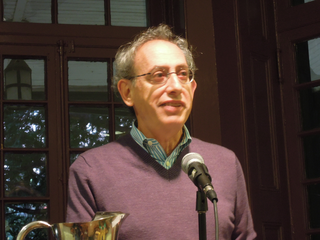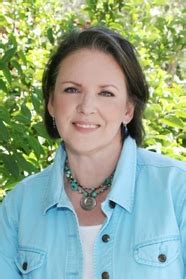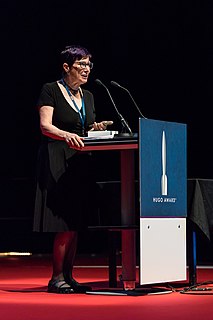A Quote by Lewis Buzbee
?"It’s not as if I don’t have anything to read; there’s a tower of perfectly good unread books next to my bed, not to mention the shelves of books in the living room I’ve been meaning to reread. I find myself, maddeningly, hungry for the next one, as yet unknown. I no longer try to analyze this hunger; I capitulated long ago to the book lust that’s afflicted me most of my life.
Related Quotes
It takes me about a week and a half to read the typical book. I don't know how many ten-day spans I have left. Eventually the unread books on my shelves will have to be abandoned, or they will join me on the pyre. The book I'm about to purchase may be among them. We all buy books we won't live to read.
The current publishing scene is extremely good for the big, popular books. They sell them brilliantly, market them and all that. It is not good for the little books. And really valuable books have been allowed to go out of print. In the old days, the publishers knew that these difficult books, the books that appeal only to a minority, were very productive in the long run. Because they're probably the books that will be read in the next generation.
One day I would have all the books in the world, shelves and shelves of them. I would live my life in a tower of books. I would read all day long and eat peaches. And if any young knights in armor dared to come calling on their white chargers and plead with me to let down my hair, I would pelt them with peach pits until they went home.
I am a product of endless books. My father bought all the books he read and never got rid of any of them. There were books in the study, books in the drawing room, books in the cloakroom, books (two deep) in the great bookcase on the landing, books in a bedroom, books piled as high as my shoulder in the cistern attic...In the seemingly endless rainy afternoons I took volume after volume from the shelves. I had always the same certainty of finding a book that was new to me as a man who walks into a field has of finding a new blade of grass.
Do you lend books and DVDs to people? If so, don't you always regret it? All my life I have forced books on to people who have subsequently forgotten all about it. Meanwhile, on my shelves sit many orphaned books loaned to me over the years by trusting, innocent souls - some as long ago as the Seventies.
I love bookshelves, and stacks of books, spines, typography, and the feel of pages between my fingertips. I love bookmarks, and old bindings, and stars in margins next to beautiful passages. I love exuberant underlinings that recall to me a swoon of language-love from a long-ago reading, something I hoped to remember. I love book plates, and inscriptions in gifts from loved ones, I love author signatures, and I love books sitting around reminding me of them, being present in my life, being. I love books.
Those who aspire to the status of cultured individuals visit bookstores with trepidation, overwhelmed by the immensity of all they have not read. They buy something that theyve been told is good, make an unsuccessful attempt to read it, and when they have accumulated half a dozen unread books, feel so bad that they are afraid to buy more. In contrast, the truly cultured are capable of owning thousands of unread books without losing their composure or their desire for more.
Books are good but they are only maps. Reading a book by direction of a man I read that so many inches of rain fell during the year. Then he told me to take the book and squeeze it between my hands. I did so and not a drop of water came from it. It was the idea only that the book conveyed. So we can get good from books, from the temple, from the church, from anything, so long as it leads us onward and upward.
So this is supposed to be about the how, and when, and why, and what of reading -- about the way that, when reading is going well, one book leads to another and to another, a paper trail of theme and meaning; and how, when it's going badly, when books don't stick or take, when your mood and the mood of the book are fighting like cats, you'd rather do anything but attempt the next paragraph, or reread the last one for the tenth time.



































